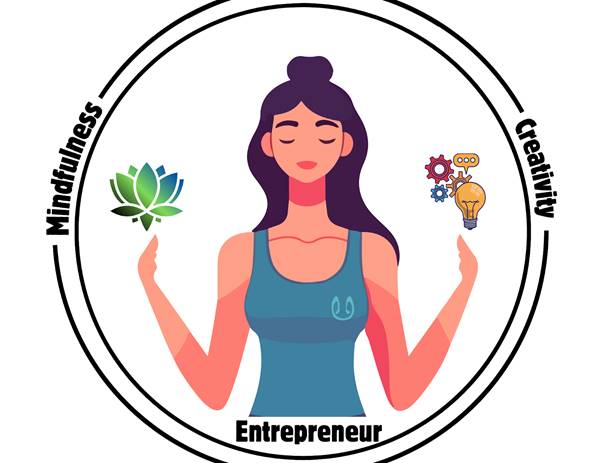The ability to innovate, adapt, and deal with obstacles creatively is often the key to success in the rapidly changing world of entrepreneurship. In recent years, there has been a growing awareness of the link between mindfulness, creativity, and entrepreneurship.
According to Valliere and Hassannezhad’s (2019) research, mindfulness promotes creativity, which is critical in the development of novel business ideas. This emphasizes the importance of understanding the link between mindfulness, creativity, and entrepreneurship in today’s competitive environment.
As entrepreneurs strive to stay ahead of the competition and carve out a market niche, leveraging the power of mindfulness and creativity can be transformative.
Join us for an exploration of how mindfulness, creativity, and entrepreneurship work together to drive innovation, resilience, and success.
Understanding Mindfulness, Creativity, and Entrepreneurship
Defining Mindfulness, Creativity, and Entrepreneurship
- Mindfulness is the awareness of one’s internal states and surroundings. Mindfulness can help people avoid harmful or automatic habits and responses by teaching them to observe their thoughts, emotions, and other current experiences without judging or reacting to them ( source American Psychological Association).
- Creativity is defined as the ability to generate unique and useful ideas, solutions, or concepts. It entails thinking creatively, challenging traditional norms, and embracing change. According to Peter Cook, author of “The Creativity Advantage,” creativity cannot be primarily induced through prescribed techniques.
- According to eminent scholars of entrepreneurship, H. H. Stevenson & J and C. Jarillo, entrepreneurship is “the process by which individuals pursue opportunities without being constrained by the resources they currently possess.” Others define it as the ability to transform a concept into a viable business venture.
The Connection of Mindfulness, Creativity, and Entrepreneurship
Mindfulness cultivates awareness and presence, whereas creativity promotes innovation and problem-solving. Mindfulness helps entrepreneurs make informed decisions, manage stress effectively, and remain resilient.
In contrast, creativity enables entrepreneurs to identify opportunities, envision novel solutions, and differentiate their offerings in the market.
They work together to create a powerful synergy that fuels entrepreneurial success while encouraging continuous growth and innovation.
Mindfulness in Entrepreneurship
Enhancing Entrepreneurial Mindset and Behavior
Mindfulness practices, such as meditation and deep breathing exercises, can help entrepreneurs cultivate a resilient mindset and emotional intelligence. Because mindfulness promotes self-awareness and reduces reactivity, entrepreneurs can navigate uncertainty and adversity with grace and composure.
A study by Ali E. Ahmed suggests that mindfulness practices may enhance an entrepreneur’s capacity to cope with stress, setbacks, and ambiguity, all of which are common challenges encountered in the startup world.
Examples of Mindfulness Techniques for Entrepreneurs
- Mindful Breathing: Taking a few moments to concentrate on your breathing can help entrepreneurs center themselves and reduce stress.
- Body Scan Meditation: This practice involves systematically scanning and releasing tension from the body, promoting relaxation and mental clarity.
- Mindful Walking: Mindful walking can help entrepreneurs stay in the present moment and stimulate creativity.
Creativity in Entrepreneurship
Power of Creativity
Creativity is vital to a successful entrepreneur because it fosters growth, differentiation, and innovation. By encouraging creative thinking and cultivating an experimental culture, entrepreneurs can create new opportunities and propel their businesses forward.
According to one study, creativity is essential to understanding entrepreneurship, emphasizing its role in navigating uncertainty and driving innovation.(source: The Role of Creativity in Entrepreneurship)
Strategies for Nurturing Creativity
- Encourage Divergent Thinking: Brainstorming sessions and idea-generation exercises can help to stimulate creative thinking.
- Embrace Failure as a Learning Opportunity: Foster a growth mindset among your team members by viewing failures as valuable learning opportunities.
- Seek Inspiration from Diverse Sources: To spark your creative imagination, expose yourself to a variety of perspectives, industries, and disciplines.
Integrating Mindfulness and Creativity in Entrepreneurial Practices
Enhancing Creativity Through Mindfulness
According to research, mindfulness practices can boost creativity by quieting the mind, lowering self-criticism, and cultivating a receptive state of mind. Entrepreneurs who incorporate mindfulness into their daily routines can unleash their creative potential and approach challenges from new perspectives.
Practical Approaches to Integration
- Mindful problem-solving involves tackling business challenges with an open and curious mindset, allowing creative solutions to emerge naturally.
- Mindful Decision-Making: Practice mindful decision-making by pausing to consider options and the long-term consequences of decisions.
- Mindful Communication: To foster a mindful communication culture, encourage active listening, empathy, and nonjudgmental responses in your team. This approach can improve collaboration, resolve conflicts constructively, and foster understanding among team members.
- Mindful Time Management: Use mindfulness-based time management techniques to help entrepreneurs prioritize tasks, manage distractions, and stay focused. Techniques like the Pomodoro Technique and time-blocking can boost productivity and efficiency while lowering stress.
- Mindful Networking: Approach networking opportunities with mindfulness, focusing on making genuine connections, actively listening to others, and remaining in the present moment. This strategy can result in more meaningful relationships, valuable collaborations, and new business opportunities.
Overcoming Challenges at the Intersection of Mindfulness, Creativity, and Entrepreneurship
Addressing Common Obstacles
Entrepreneurs may encounter obstacles like resistance to change or stakeholder skepticism when incorporating mindfulness and creativity into their businesses.
By acknowledging these obstacles and taking a proactive approach, entrepreneurs can better navigate challenges and foster an innovative and well-being culture.
Strategies for Success
- Lead by Example: Showcase the importance of mindfulness and creativity in your own leadership style. Show your team the importance of being present, open-minded, and innovative when making decisions and solving problems.
- Create a Supportive Environment: Encourage a culture of psychological safety and experimentation in which employees feel empowered to take risks and pursue innovative ideas. Encourage open communication, constructive feedback, and a desire to learn from successes and failures.
- Encourage collaboration and cross-functional teamwork to maximize your team’s collective creativity. Create brainstorming sessions, collaborative projects, and knowledge-sharing opportunities to generate new ideas and perspectives.
- Provide Resources and Training: Invest in resources and training programs to help your team members develop mindfulness and creativity. Provide workshops, seminars, and online courses on mindfulness practices, creative thinking, and problem-solving strategies.
- Encourage Work-Life Balance: Understand the significance of work-life balance in fostering creativity and well-being. Encourage employees to prioritize self-care, take frequent breaks, and pursue hobbies and interests outside of work to recharge and revitalize their creative energies.
Case Studies and Success Stories
Real-World Examples of Mindful and Creative Entrepreneurship
Case Study #1: Headspace
Headspace, a meditation app founded by Andy Puddicombe and Rich Pierson, exemplifies the relationship between mindfulness and entrepreneurship.
Headspace has cultivated a global community of millions of users by leveraging technology to make meditation accessible and engaging, revolutionizing how people approach mental health.
Case Study #2: AirBnB
Airbnb, founded by Brian Chesky, Joe Gebbia, and Nathan Blecharczyk, exemplifies the power of creativity in entrepreneurship.
Airbnb has disrupted the travel industry by transforming the concept of hospitality and accommodation. It allows individuals to monetize their spaces while also fostering global connections and cultural exchange.
Case Study #3: Tesla
Tesla, founded by Elon Musk, is a prime example of mindful and creative automotive entrepreneurship. Tesla revolutionized the electric vehicle market by focusing on sustainability and innovation.
Tesla has redefined transportation by combining cutting-edge technology, sleek design, and a commitment to renewable energy.
Cultivating a Mindful and Creative Entrepreneurial Culture
Leadership Strategies for Promoting Mindfulness and Creativity
Effective leadership is critical for cultivating a culture of mindfulness and creativity in entrepreneurial organizations. Leaders can foster an environment conducive to innovation and individual growth by prioritizing employee well-being, encouraging experimentation, and celebrating diverse perspectives.
Some Actionable Steps for Implementation:
- Encourage employees to maintain a healthy work-life balance by establishing boundaries, taking breaks, and prioritizing self-care. This can help to prevent burnout and create a more positive and productive work environment.
- Create Designated Creative Spaces: Set aside workplace areas for brainstorming, ideation, and creative collaboration. These spaces should encourage creativity and provide tools and resources to support innovation.
- Develop a Feedback Culture: Encourage team members to communicate openly and provide constructive feedback. Create regular feedback sessions where employees can share ideas, provide feedback, and make suggestions for improvement.
- Provide Continuous Learning Opportunities: Provide ongoing training and development programs to help employees improve their skills and stay current on the latest trends and technologies. Workshops, seminars, online courses, and mentorship programs are all possible options.
- Recognize and celebrate both successes and failures as essential learning opportunities. Encourage a culture of experimentation and risk-taking, with failure seen as a natural part of the creative process.
In Summary
The link between mindfulness, creativity, and entrepreneurship is undeniable.
Entrepreneurs who incorporate mindfulness practices into their daily routines and embrace creative thinking can realize their full potential, drive innovation, and achieve long-term success.
As you begin your entrepreneurial journey, remember to practice mindfulness, foster creativity, and embrace the possibilities that await you.
Keetria is an entrepreneur, wellness advocate, and brand strategy coach for creatives & entrepreneurs with 16 years of public relations expertise working with some of the world’s leading brands, startups, media personalities, and entertainers. If you want to work together, don’t hesitate to reach out!







